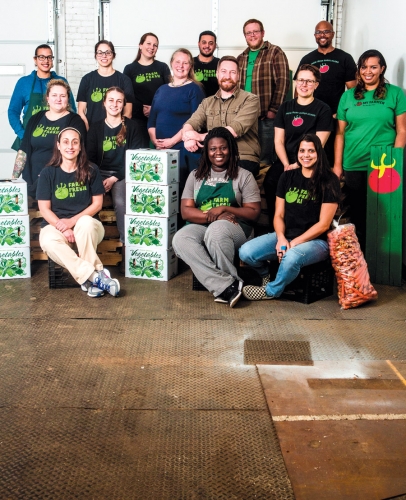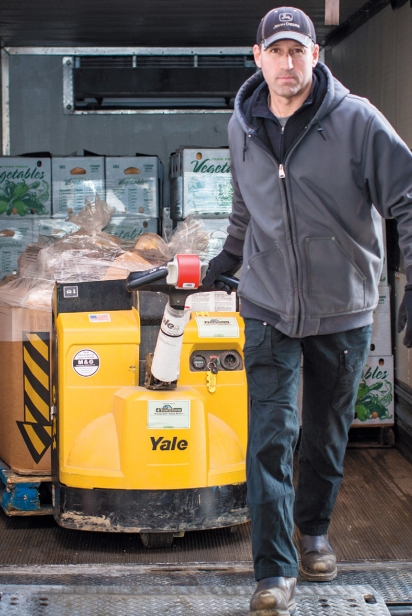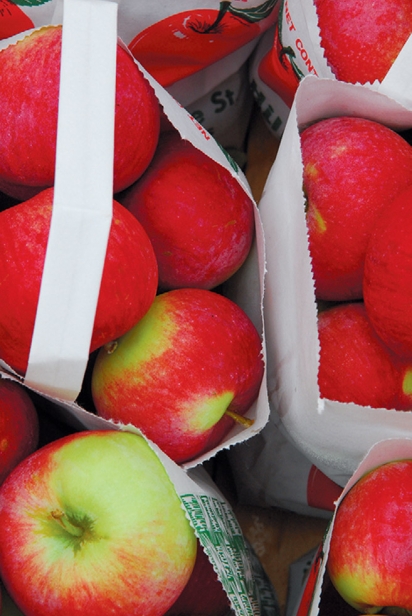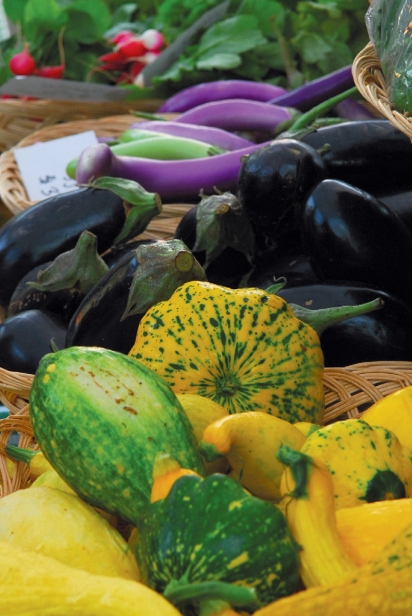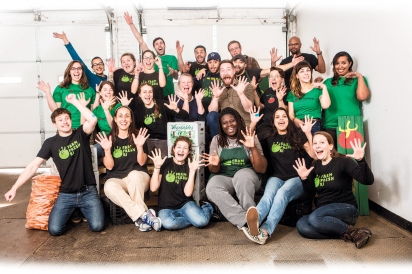Farm Fresh RI Celebrates
From Student-Led Project to Nationally Recognized Organization; Moving Fresh Farm Foods into the Hands and the Kitchens of Rhode Islanders
It started as a question and a student project for Brown University student Louella Hill: In a state as small as Rhode Island, why can’t we connect more local farmers with local consumers?
She began to identify farms that were willing to supply Brown’s dining services, and she helped persuade dining services to work with the farms. With the establishment of that relationship, as well as an on-campus farmers’ market in 2004, Farm Fresh RI was born.
Noah Fulmer came on board in 2005 and, with Hill, established three main goals: to forge more wholesale connections for farmers; to organize more farmers’ markets; and to create an online database of local farms (Fulmer’s particular area of expertise). That website now gets over a million hits a year. Fulmer remained at the Farm Fresh helm from 2007 to 2013, when he headed to Michigan; Hill left in 2006 to co-found Narragansett Creamery (with Mark and Pattie Federico) and is now a cookbook author living in Virginia.
Sheri Griffin, who started as a volunteer in 2005, became the program director in 2007, and then co-executive director, with Jesse Rye, when he came in 2013. Griffin grew up on a citrus farm in central Florida; Rye grew up in Wisconsin—both his mother and grandmother were school “lunch ladies.” Before coming to Farm Fresh, he was doing research and advocacy for cultural and arts organizations in the DC/Maryland area.
“Our earliest work, coupled with growing national awareness of choosing local produce,” says Griffin, “spurred growers to start up or expand and made consumers aware of their local food options.”
Farmers’ Markets and Bonus Bucks
In the winter of 2007–08, Farm Fresh set up a winter farmers’ market at AS220 in downtown Providence. Its popularity led to a move to the Hope Artiste building in Pawtucket the following winter (soon followed by their staff and programs). The Pawtucket Wintertime Farmers’ Market has grown to be the largest indoor market in New England. Simultaneously, the independent markets like the Hope Street Farmers’ Market Association and the Aquidneck Growers’ Market were expanding their markets as well. The total number of farmers’ markets around the state reached 47 in 2016, including independent, DEM-sponsored and the nine markets managed by Farm Fresh.
From the get-go, Farm Fresh recognized a distinct need for farmers’ markets in low-income neighborhoods, such as Woonsocket and Central Falls. They bought machines to accept SNAP (Supplemental Nutrition Assistance Program) benefits, formerly known as food stamps. They also created the Bonus Bucks incentive (in partnership with nonprofit Wholesome Wave), giving an extra $2 bonus to purchase fresh farmers market produce for every $5 bought using SNAP. (Currently 32 summer markets have the machinery to accept SNAP and Farm Fresh is funding the Bonus Bucks at 28 of them.)
Farm Fresh staff also set up “Healthy Foods, Healthy Families,” a program of bilingual, multicultural food and nutrition workshops at summer markets to encourage shoppers to try new foods.
Market Mobile
Also in 2009, Farm Fresh’s Market Mobile project came about because chefs wanted more local products but they didn’t feel they had the time to make contacts with the farms. Farm Fresh volunteered to be the wholesaler, with the farms delivering to a warehouse space where Farm Fresh staff sorted the bounty. In its first year, Market Mobile moved $200,000 worth of food (10 times the amount they had envisioned, according to Griffin), and last year over $2 million worth. Farm Fresh takes 18% to cover labor costs, trucks and transportation, storage and other staffing needs. (This is a low figure in comparison to standard wholesalers.) Farmers set their own prices and keep their own brand (so that a restaurant can specify their product), and Farm Fresh prioritizes payments to the farms.
“We want to make sure they have the money in their pockets,” Rye emphasizes.
“And everything is pre-sold,” adds Griffin.
Currently there are 300 different customers, over 70 vendors and four truck routes—one to Boston, one to the Providence area, one to Newport and one to South County. Farm Fresh staff have made a push to get Market Mobile into local educational institutions, which now include Roger Williams University and the Rhode Island School of Design.
High-end restaurants, such as Gracie’s, the Ocean House and those owned by Newport Restaurant Group, are joined by smaller customers, such as Cafe La France in the Providence train station, Duck & Bunny, Charlestown Wine & Spirits and corner store Eastside Mart. Market Mobile even supplies a bagel shop in Boston with Narragansett Creamery cream cheese, and corporate cafeterias such as Blue Cross/Blue Shield. Chefs who move from one eatery to another have spread the word about Market Mobile, as have restaurateurs who own multiple establishments.
Farm to School and Veggie Box
As Farm Fresh’s staff grew (now 22 full-time, plus another 11 part-timers), so did their dedication to getting local, farm-grown food to people who might not otherwise be exposed to local markets. They worked with every school district in the state to provide local farm products to their cafeterias (Farm to School), and they are now recognized as one of the top such programs in the country.
“We try to make it fun for both the cafeteria workers and the kids,” Rye explains. “We do a ‘Harvest of the Month,’ when we feature a particular vegetable or fruit that the cooks then highlight.”
The Veggie Box project is a creative way to reach out to people at workplaces and community centers who may not have easy access to a farmers’ market and may never have heard of community-supported agriculture (CSA) harvest subscription programs at local farms. Veggie Box is a weekly subscription to local products and now includes 80 places with 11,000 boxes provided. It also includes a newsletter about local farms and recipes.
Farm to Senior and Farm to Food Pantry
The Farm to Senior program runs nutrition workshops, including occasional cooking demonstrations and even samples from local farms, at senior housing communities or senior centers, as a way to get older citizens interested in local foods and farmers’ markets.
The Farm to Food Pantry system delivers excess produce from farmers’ markets or from Market Mobile deliveries to 10 local food pantries.
Harvest Kitchen
Harvest Kitchen is currently expanding the culinary training program that Farm Fresh first instituted in January 2010. Drawing on local harvests of apples for their “winter product line,” instructors take eight students through a 15-week food safety and food preparation course and end up with jars of applesauce, now in three varieties, including plain, strawberry and cranberry (the latter two also local fruits). The “summer line” includes pickled vegetables (they have a contract to provide pickled green tomatoes to a Jamaica Plain deli), canned tomatoes and canned peaches.
The students are aged 16–19, some in and some out of school, many from the Rhode Island Training School. The training sessions had been late afternoons but with recent support from the Department of Health and the Department of Children, Youth and Families, Harvest Kitchen will offer two daily sessions and double the number of students to 50 per year.
Program director Jennifer Stott explains that they hope to teach these young people “what it means to have a job,” and during the last part of the program, they prepare them for a five-week internship, with the hope that it leads to employment.
Stott is excited about a brand-new initiative that will set up a 20-seat café and a corner store in the front of the Harvest Kitchen space at 2 Bailey Street in Pawtucket, offering SNAP-eligible prepared foods and nutrition education to neighborhood consumers. The food will be locally sourced, prepared and refrigerated. A shopper could choose components for a meal, such as salad, vegetables and a protein, or a TV-dinner-style meal, with chicken and potatoes, for example.
“We are researching practices around the country,” Stott says, “and we will open the storefront in May.”
The Challenges of Growth
In the beginning, Rye explains, “to fit the values of a local food system, we had to build champions [in the kitchens], people who would stand up and say that they believed in what we were doing.” If a restaurant or institutional buyer had menu systems that didn’t accommodate unpredictable seasonal harvests, it often took an insider to push for change. But other chefs and owners understood the leap in quality of the farm-fresh products, and they were willing to make the last-minute menu changes sometimes required.
“The cool thing is that we’ve seen chefs step up and demonstrate to their colleagues how they can do it,” says Rye.
Other challenges involved the logistics of setting up and managing the Wintertime Market or working out the kinks in Market Mobile deliveries. And as all of their projects mushroomed with the demand for fresh and local food, Griffin readily admits that “doing more administrative stuff is not as much fun as selling vegetables.” Yet both she and Rye agree that Farm Fresh needed to make changes to keep up with its rapid growth.
“Hiring a business manager, for example,” notes Rye, with a smile, “had made sense for a long time. We just finally did it!”
An even bigger move will be to a new building on a 3.3-acre parcel in the Valley neighborhood in Providence where someday they hope to move the Wintertime Market.
“We will locate all of our programs and projects there,” Rye explains. “It will allow us to build in greater efficiencies we currently lack, and we hope to also offer space to others with whom we collaborate.”
And knowing the energy, enthusiasm, creativity and persistence of the Farm Fresh staff, there will be ever-expanding projects, along with brand-new ones, to get local farm-fresh foods to all the citizens of L’il Rhody.
For more information about Farm Fresh RI and its programs, visit FarmFreshRI.org.


